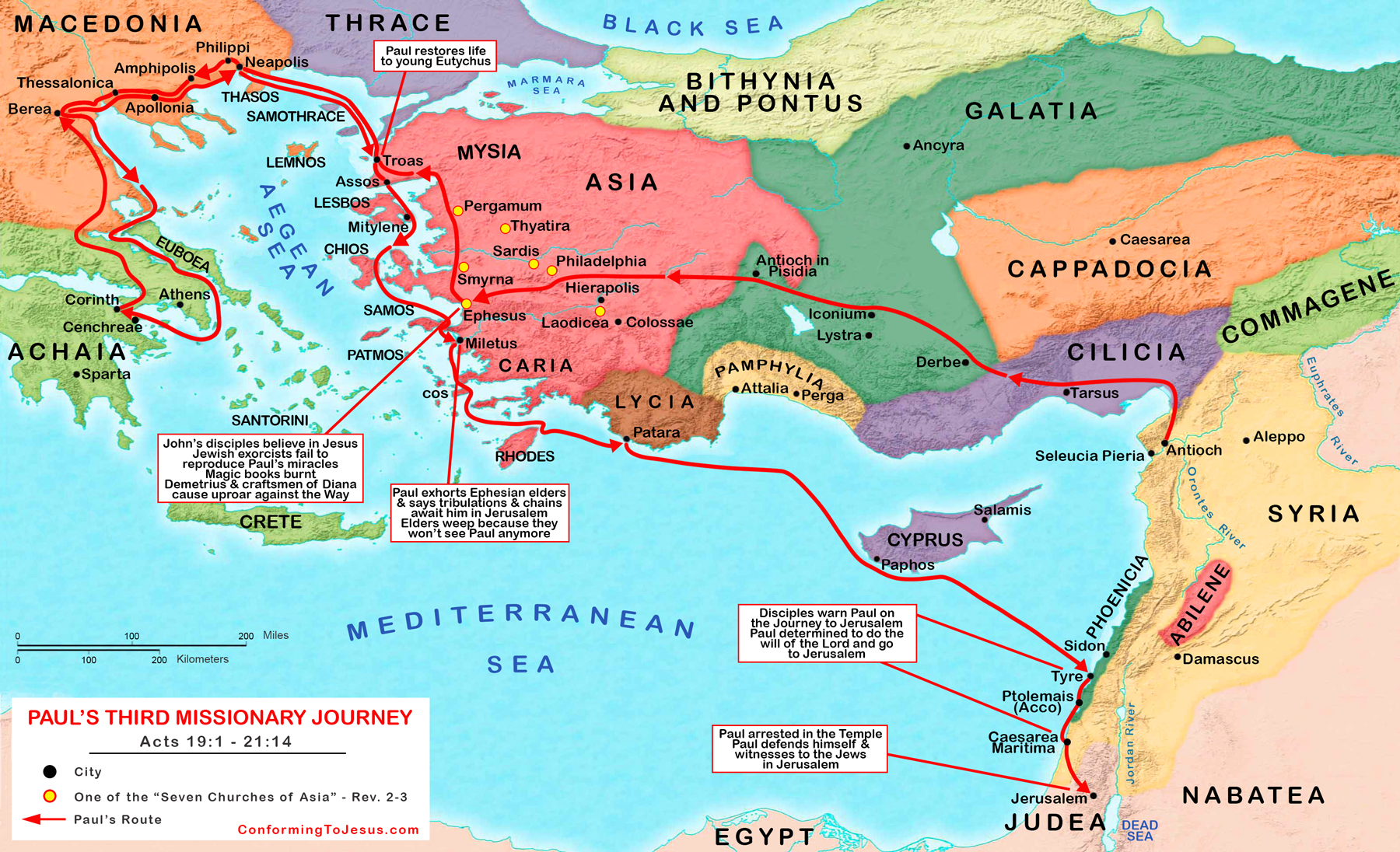Notes for my weekly Bible Study group.
Resources
- Acts overview (video): Part 1, Part 2
- Reading Guide
- Teaching Notes (PDF)
- Video
Overview

- Jews were plotting to kill Paul. Many people hated Paul because of what had happened before the Jewish Council.
- Paul sent for the disciples in Ephesus and said goodbye before heading north to Macedonia. Paul went through the places he visited on his second missionary journey before moving into Greece, where he stayed three months. He planned to sail from Greece to Syria, but when he found out about a plot the Jews had planned against him, he went back through Macedonia. There was also opposition from Paul’s fellow countrymen and sidestepping this plot did not mean Paul would not face difficulties.
- Co-laborers accompanied Paul from the towns of Macedonia and Asia. These co-laborers went ahead of Paul and Luke and waited for them in Troas. Paul and Luke left Philippi after the Passover and reached Troas in five days (instead of the two days it
took to sail to Philippi the last time). They spent seven days in Troas before moving on. - On the first day of the week (Sunday), Paul and his companions assembled to break bread together and hear Paul speak. Paul continued to speak until midnight since he was leaving the next day. The Jews had kept the Sabbath (from dusk on Friday night to dusk on Saturday) as part of the Mosaic Law. The agreement made in the Jerusalem Council did not require Christians to observe the Saturday Sabbath since they were under the New Covenant. Paul never taught those he led to Christ to keep the Sabbath. There is no command in the New Testament about when the church should worship.
- A young man was sitting in a window listening and fell asleep, possibly because of the fumes from the oil-burning lamps. Eutychus, the young man, fell out of the third-story window and was found dead on the ground. Paul went down and embraced Eutychus’s body and said the boy was still alive. Paul went back upstairs, ate, continued teaching until dawn, and then left. The boy was taken home alive. Paul was able to heal Eutychus because Jesus gave His disciples the command to heal the sick and raise the dead.
- Some of Paul’s group sailed ahead to Assos to meet Paul, while Paul traveled by land. Paul then sailed with them from Assos to Mitylene, then to Chios, then to Samos, and the next day to Miletus. It feels as though the journey had begun to pick up speed. Paul even decided to bypass Ephesus and Asia because he was in a hurry to get to Jerusalem before Pentecost.
- While in Miletus, Paul asked the elders in Ephesus to come to him. When they arrived, Paul reminded them of the time he had spent with them and the ministry of evangelism he had shared with them. Paul then told them about what he anticipated would happen in Jerusalem—that the Holy Spirit had told him chains and afflictions waited for him. Paul took this as confirmation of what he had been called to do in testifying to the gospel of Christ.
- Like Paul, we need to realize that our job is to share the gospel, not to lead people to accept Jesus. Accepting Jesus is up to the individual after they have heard the message of the gospel.
- Paul told the leaders he would never see them again but that he would remain obedient to God’s call on his life. Paul described his obedience to “the whole plan of God”.
- Since Paul knew he was moving toward his own death, he warned the elders to be on guard for themselves. He warned the church to guard against false teachers within the church and against opposition from without.
- Paul committed them to God and reminded them he had asked nothing for support from them. Paul then prayed for them, and they embraced Paul, all weeping at this final departure
